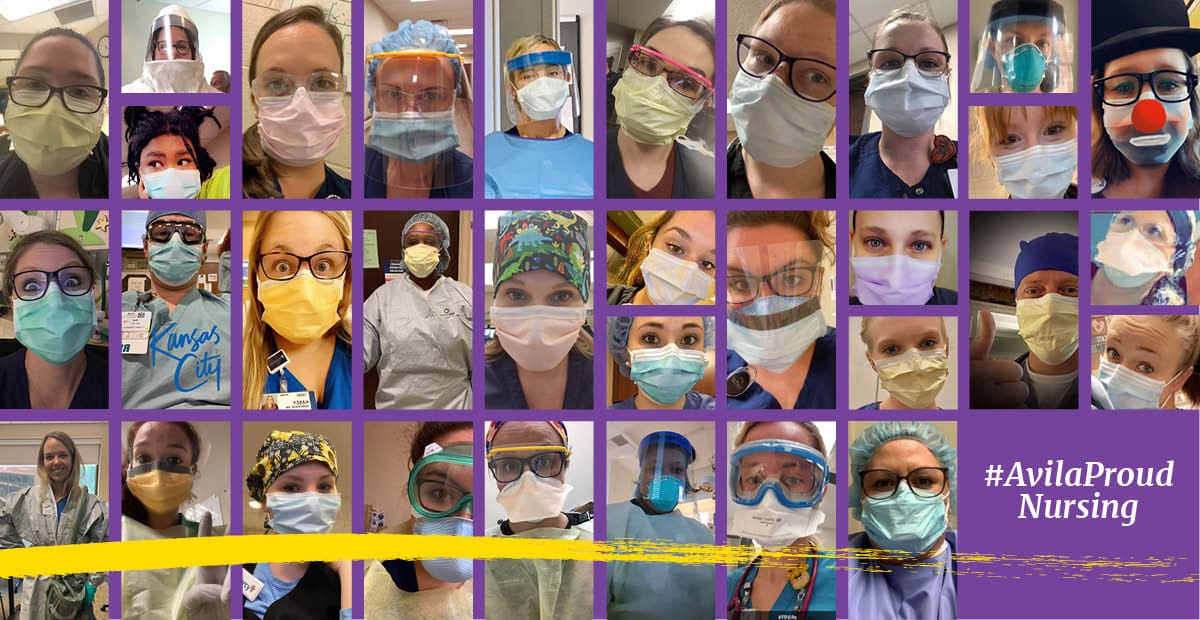Built for Excellence
The nursing prelicensure (TBSN, ABSN and RN-BSN) program curriculum is built around outcomes relating to Professional Role Competencies, Effective Communication, Clinical Reasoning, and Personal Knowing, Spirituality, and Cultural Humility. The nursing major curriculum spans four semesters, with each semester building upon the previous one to ensure progressive development of clinical and professional skills.
Explore RN-BSN Admissions »
Built for Your Success
COURSES
Courses in the pre-licensure nursing major are designed to prepare the student as a graduate nurse to practice in a variety of settings. Avila’s nursing program is grounded in the natural and social sciences, arts, and humanities, as well as the theoretical knowledge and skills needed to practice nursing. The curriculum is designed to develop personal and professional values that enable the student to better assume the responsibilities they will face in contemporary society. An emphasis is placed on safe and quality nursing practice, effective communication, professional competencies, clinical reasoning grounded in evidence, and socially and globally responsible health care.
CLINICAL
Nursing students participate in clinical/lab courses through four semesters of the nursing major. Diverse types of experiences in traditional settings, such as the acute care setting (e.g., hospital) and in less traditional settings (e.g., hospice, school settings, and home care) help integrate community and societal health concepts and prepare students for nursing careers across a wide variety of emphasis areas.
SIMULATION
Simulation is an interactive experience that allows learners to develop, refine, and apply knowledge and skills in a realistic clinical situation. Through simulation, real-world care scenarios replicate instances where the situation may occur infrequently but are significant in the provision of quality patient care. Simulation provides learning opportunities within a safe, supervised setting without posing a risk to a patient. The safety of the simulation environment facilitates the development of critical thinking, problem-solving skills, and nursing skills.
Sample 4-year Pre-Licensure Nursing Curriculum
| Freshman Year | |
| First Semester (13-17 hours) | Second Semester (16 hours) |
| General Microbiology w/lab | General Chemistry I w/lab OR Molecules that Matter |
| General Psychology | Sociology, Social Problems-Social Change OR Intro to Social Welfare |
| English Composition I | Fundamentals of Communication |
| College Algebra | CORE |
| CORE | CORE |
| First-Year Seminar (optional for transfer students) |
| Junior Year | |
| First Semester (15 hours) | Second Semester (14-17 hours) |
| Health Assessment | Health and Illness Concepts II |
| Foundations of Health & Illness Concepts | Women & Children Health Concepts |
| Development of Professional Nurse | Psychosocial Nursing Concepts |
| Pharmacology | Practicum I |
| Introduction to Practicum | Core |
| Sophomore Year | |
| First Semester (18 hours) | Second Semester (16 hours) |
| Nutrition | Life Span Development |
| Ethics | Statistics OR Social Statistics |
| Anatomy and Physiology w/lab | Pathophysiology |
| CORE | CORE |
| CORE | CORE |
| Senior Year | |
| First Semester (15-18 hours) | Second Semester (12-15 hours) |
| Health and Illness Concepts III | Leadership and Management |
| Population-Based Health Concepts | High Acuity Nursing Concepts |
| Gerontologic Nursing | Practicum III |
| Practicum II | Capstone Practicum |
| Foundations of Evidence-Based Nursing | CORE |
| CORE |
Clinical Requirements
Once you have been accepted into Avila’s nursing program, you must:
- Provide immunization documentation and other Avila and clinical agency requirements prior to the beginning of and continuing throughout nursing clinical courses (these requirements are subject to change).
- Complete criminal disclosure information and background check.
- Hold current certification in Basic Cardiac Life Support (BCLS) (Health Professional American Heart Association 2 year)
- Provide proof of the absence of active Tuberculosis (2-step TB screen or IGRA).
- Submit a negative drug screen
- Carry health insurance coverage while in the nursing major (a health insurance form must reflect company and coverage and be on file in the nursing office).
Outcomes Assessment
Outcomes assessment is used throughout the educational process at Avila to evaluate program effectiveness. The program of nursing, university, and/or accrediting agencies determines assessed outcomes. Assessment activities occur throughout, at the end of the nursing curriculum and post-graduation. Assessment early in the nursing curriculum can provide the faculty with a baseline from which to evaluate the curricular impact on outcomes. Assessment activities may also include course assignments or surveys. Post-graduation outcome assessments help to evaluate such things as graduate and employer satisfaction and success on the nursing licensure examination. The nursing program curriculum outcomes are:
- Integrate nursing knowledge to make informed clinical judgments and to innovate in nursing practice, ensuring safe, effective, and equitable care.
- Demonstrate the ability to deliver holistic, individualized, and evidence-based care that is respectful, compassionate, and developmentally appropriate to address the needs of diverse individuals and communities.
- Employ basic principles of safety and quality improvement to minimize risk and improve client care by evaluating and refining nursing practices that contribute to optimal client outcomes.
- Collaborate effectively within interprofessional teams to plan and implement client care through coordinated and inclusive partnerships with clients, families, and other stakeholders, enhancing healthcare experiences and outcomes.
- Exhibit a sustainable professional nursing identity through continuous personal and professional development, embracing leadership opportunities that foster resilience, lifelong learning, and advocacy in diverse healthcare settings.
